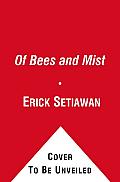Critical Mass regularly features an exemplary review by a National Book Critics Circle member critic. This week, in a review originally published in the Miami Herald, Christine Thomas considers Erick Setiawan’s Of Bees and Mist.
Forget the melting pot. When you’re raised within a conglomeration of cultures and geographies, you’re more likely to feel perpetually displaced rather than abundantly connected. That’s why computer scientist Erick Setiawan regularly turned to literature as an escape from a tri-fold identity struggle. He was born in Jakarta, Indonesia, to Chinese parents and emigrated to the United States at 16.
In his debut novel Setiawan concocts a richly drawn fantasy world. This hefty manuscript’s imaginary geography is pregnant with customs, beliefs, superstitions and folklore that have fascinated Setiawan since youth. He incorporates in his central character Meridia a taste for Chinese “salted plums, sticky buns, [and] sweet bean curd in steaming ginger soup.’’ Though modern elements such as nail salons and massage therapists alight here, the setting is also suspended beyond time in an era that feels ancient and otherworldly, one in which gold bars are deposited on doorsteps, and women are strategically married off.
Within his ambitious, 30-year canvas, the story arc is driven by Setiawan’s childhood, echoed in the depiction of Meridia’s feud with her vicious mother-in-law Eva while her son Noah, stuck in the middle, navigates blows.
This landscape is undeniably intriguing, and Setiawan’s luxuriously paced descriptions and whimsical, inventive devices can be seductive. But not all readers will feel at home here. The simple story—led by a clairvoyant narrator who sticks close to Meridia, except for a few unnecessary, momentary slips into other points of view—is a magical-realism hybrid, despite Setiawan’s protestations that he merely siphoned multiple influences from Chinese martial arts films to English literature, and yes, Garcia Marquez. In the town market “a woman grew herbs out of her body . . . which customers plucked fresh with their own hands.’’ At Meridia’s childhood home, the stairs move about like those in Harry Potter films, and each night her father disappears into colorful mists while her mother remains imprisoned by forgetfulness.
Yet fantastical worlds thrive only when the rules are clearly delineated, and Setiawan dangerously treads the line between an anything-goes fairy tale and meaningful symbolism. Meridia’s father Gabriel disappears in mists because Setiawan likes how Chinese martial arts films use that technique, and a lecherous half-swine man who emerges late in the novel is so drawn simply because Setiawan enjoys the childhood legend. But, what amuses Setiawan isn’t always justified within the story, so it’s a boon when enchanted elements become more purposeful.
The portrait of Meridia’s struggles for independence while growing up with unusually distant parents is touchingly sketched. Her marriage at 16 to her first love, Daniel, is a story that pulses with life while at the same time delivering her into Eva’s hellishly unyielding grip. And when her naivete is shattered, the two families clash spectacularly, like Capulets and Montagues.
Where Setiawan ultimately succeeds is in crafting memorable, identifiable characters and an enjoyable story rooted in human emotion. Love, longing and the pain of compromise are indeed recognizable to all, no matter our culture or geography.


